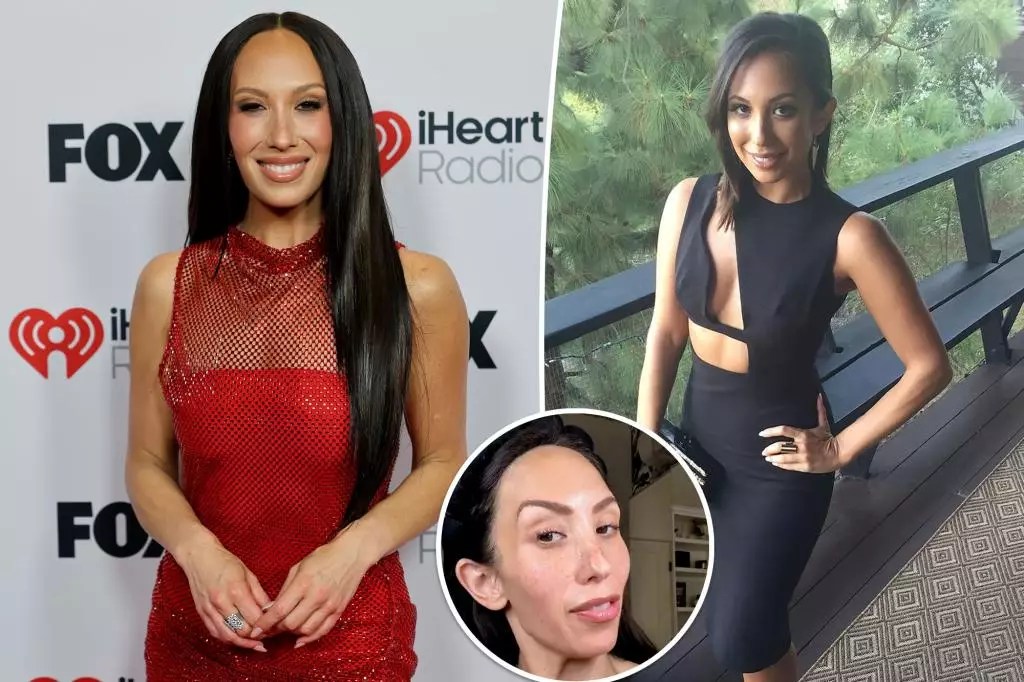Cheryl Burke recently stirred a conversation about self-image and personal growth that resonates far beyond the surface. In a candid TikTok video, she chose to appear without makeup, delivering a powerful message in the face of online trolls who criticized her for looking “thin” and “different.” For many public figures, such personal revelations can often spiral into a precarious dance of validation and self-doubt, especially in a world where every appearance is scrutinized. However, Burke’s decision to embrace her raw self showcases a bold commitment to authenticity, an increasingly rare quality in celebrity culture.
Finding Strength in Vulnerability
Burke’s narrative isn’t merely about dealing with aesthetic comments; it dives deeper into the essence of navigating life’s inevitable transitions. At 41, the former “Dancing With the Stars” pro expresses a journey of “surrendering” and embracing change, highlighting growth as an essential part of life. Her therapist’s encouragement to believe in her ability to evolve speaks volumes about the often-overlooked connection between mental health and body image. While societal pressures pound relentlessly on how women, in particular, are perceived, Burke’s openness to share her vulnerabilities offers a refreshing reprieve from the heavily edited lifestyle promoted by many influencers.
By stating that she has “never felt more alive,” Burke counters the traditional narrative that equates thinness with sickness or fragility. She pushes back against the incessant need for external approval, reminding her audience that one’s worth and health cannot be distilled into a few seconds of video commentary. This brave stand not only empowers herself but also encourages viewers to reflect on their own judgments and assumptions about others.
Support and Critique: A Double-Edged Sword
The dichotomy of reactions to Burke’s video illustrates the complexity of public reception in the digital age. On one hand, fans showered her with affirmation, praising her natural beauty and encouraging her to remain authentic. Comments such as “You are beautiful naturally” evoke a community of support that many crave in a world filled with criticism. This camaraderie is vital, as it cultivates a space where individuals can express their true selves without the weight of societal expectations stifling them.
Conversely, the skepticism from some quarters raises questions about the nature of online discourse. While critics may argue the validity of their opinions, Burke’s poignant reminder that “people will watch a 30-second video and think they know everything about you” brings to light an essential truth about the superficiality of social media judgments. The whisper of concern regarding her appearance may stem from genuine concern, yet it underscores a societal tendency to dissect appearances without acknowledging the underlying stories of personal growth and health that may run deeper.
An Invitation for Self-Reflection
Burke’s narrative is a powerful invitation for society to reconsider how we engage with one another in the digital realm. It challenges us to rise above the immediate instinct to critique and fosters an environment of understanding and empathy. The notion of “taking a back seat” could very well serve as a broader directive for online interactions in general—encouraging individuals to listen more, judge less, and ultimately support one another in their unique journeys of self-discovery. As Burke continues to traverse her path of self-acceptance and healing, she serves not only as a beacon of empowerment but also as a catalyst for a much-needed dialogue about the intricacies of identity, body image, and the power of being unapologetically oneself.


Leave a Reply